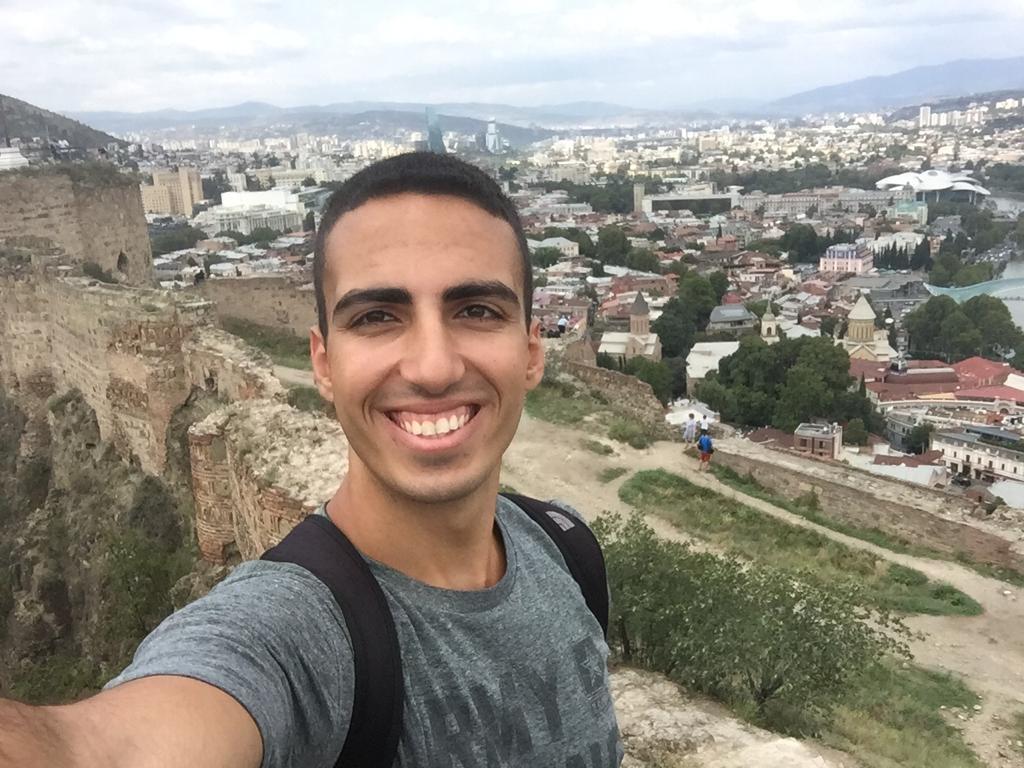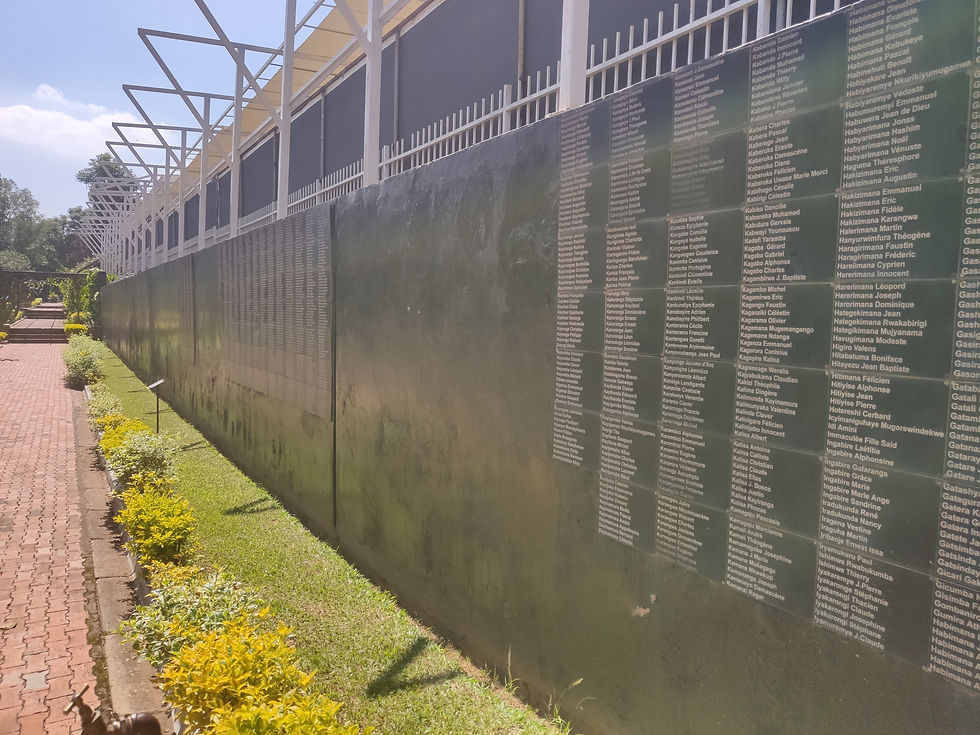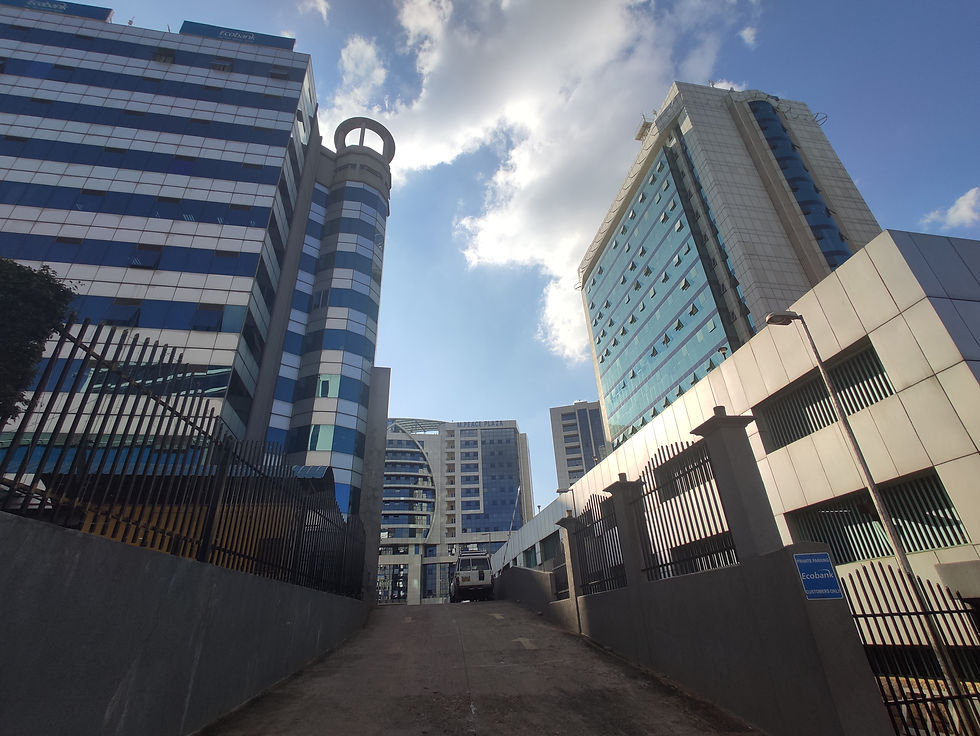Kigali, the "Other" Africa
- Aaron Schorr

- Jan 16, 2020
- 5 min read
I booked a flight home with a 13-hour layover in Kigali, Rwanda in order to get to explore the city, $30 tourist visa notwithstanding. Even in this short period of time, I was completely blown away by how different Rwanda was from Kenya.
According to the online research I'd done, the best way to get around Kigali was motorcycle-taxis. There was even an Uber-like app which held its drivers to very high safety standards and monitored them in real time. Say no more! I left the airport and got one halfway across the city, the 10 kilometer journey costing 1200 Francs ($1.25) and providing me with the first signs that I was in a totally different place. To start with, the driver offered me a helmet - a proper, safe one - without me even asking, something I had not encountered once in dozens of motorcycle rides in Kenya. The roads were in perfect condition and everything was immaculate - not a scrap of trash to be seen anywhere, grassy medians, and wide sidewalks. There were functioning traffic lights (!) the drivers actually obeyed (!!) and traffic flowed freely; the absence of honks was almost unsettling.
Never Again?
My first stop was the Kigali Genocide Memorial, a solemn, excellently-done museum telling the story of the epic human tragedy that is the 1994 Rwandan Genocide. The scope of the horror is almost beyond imagination, with stories of neighbors murdering each other, children hacked to death with machetes at roadblocks, and a priest ordering to bulldoze his own church, killing the 2,000 innocent people hiding inside. Approximately a million people died in 100 days and it happened 25 years ago. The part that really sent chills down my spine, though, was a quote by Apollon Kabahizi, a survivor of the genocide:
"When they said 'never again' after the Holocaust, was it meant for some people and not others?"
It was nearly too much to bear; even writing this two days later is bringing tears to my eyes. "Never Again" was practically the mantra I had grown up on as a Jew and an Israeli, a nearly sacred belief that the Holocaust was the absolute low point of human history which would never be reached again, yet here it had happened again, nearly within my lifetime, and the world made no attempt to stop it. It took me a full half hour of walking the Memorial's gardens until I was ready to continue touring the city.

Colonial History and Cobras
The next place I wanted to visit was called the Kandt House, home of Rwanda's first colonial governor. The internet said there was a bus heading there; I was skeptical after my experience with buses in Nairobi but I decided to give it a try. As it turns out, Kigali does actually have buses - proper city buses with electronic payment cards, uniformed drivers, and everything you would never expect from an African public transportation system. The problem was, every bus that arrived was completely full and wouldn't let me on, so I needed to take another moto-taxi.

This proved to be easier said than done, since none of the drivers or passersby spoke any English (more on this in a bit) and could figure out where I wanted to go. I ended up just catching a ride downtown and walking to the museum, which was an eclectic mix of colonial history, photos of life in Rwanda before colonialism, modern art, and a snake collection. I couldn't quite figure out what the common denominator was, but it was interesting. The museum had a copy of the letter that a German army officer passed on to the the Rwandan king, politely informing him that he and his subjects were thus forth subjects of the Kaiser, which settled that matter.

I spent the rest of the afternoon wandering around downtown, visiting a memorial to 10 Belgian commandos who were lynched in the first day of the genocide, watching the sunset from a very hipstery cafe located in a bookstore, and having delicious Ugandan rolex (vegetables and eggs rolled into chapati, sort of like African shawarma).

How Countries Mourn
Rwanda was giving me a lot of food for thought. Here was a country that had endured a civil war and tragedy of epic proportions that shattered its economy and institutions and within a generation managed to rebuild itself to one of the fastest-growing economies in Africa, without any mineral- or fossil fuel-based wealth. Where people murdered each other 25 years ago, heavily-armed policemen now keep a watchful eye out for any trouble and ensure very low crime rates. What was the secret behind this transformation?

The answer appeared to be multifaceted. On the political front, post-genocide Rwanda has essentially become a benevolent dictatorship. Paul Kagame, who commanded the military force that ended the genocide in 1994 (the RPF), has been the president for nearly 20 years, prioritizing stability and growth while systematically rooting out all opposition to his rule. The scope of the tragedy seems to have also played a role, drawing a possible parallel with Japan post-Hiroshima and Nagasaki.

The main factor behind the change, however, seems to be Rwandan society itself, which has proven itself a role model in dealing with national trauma. Having experienced the immense harm that had come from ethnic divides, Rwandans decide to essentially do away with them altogether, building a new national identity focused on unity and shared values. In order to help imbue the nation with this sense of unity, the country passed a law in 2009 requiring every Rwandan between 18 and 65 to devote the last Saturday morning of every month to community service, ranging from sweeping streets to digging drainage ditches to building schools in a practice called umuganda. Realizing that post-genocide international tribunals and traditional courts were not going to be able to try the tens of thousands of perpetrators effectively, Rwandans set up a system of traditional courts called gacaca in 2001, in which hundreds of thousands of people were tried for their role in the events of 1994. It was a fascinating experiment in communal justice, and obviously not without criticism, but it's definitely had a huge role in helping the nation move forwards without the desire for revenge (you can read more about it here).

African Oddities
Despite the spotless streets and economic growth, Rwanda is not free from African idiosyncrasies. Chief among these is the language. As a former Belgian colony, Rwanda officially spoke French, though most of the country only spoke the native language, Kinyarwanda. Then in 2008, amid deteriorating relations with France and a desire to open itself economically to the world, Rwanda suddenly decided to become an Anglophone country. Signs were changed and English was to be taught in schools, despite the teachers themselves not speaking the language. The result, nearly 12 years later, is that hardly anyone outside the tourism industry and the well-educated speaks a word of English, and I mean that quite literally. Street vendors communicate with hand gestures and moto-taxis don't understand what you want. Signs on the street are a mess of English, French, and Kinyarwanda, leaving me to wonder how the locals understand them themselves. This is similar to Kenya (but more extreme), where the official language is English and literally almost every sign is in English, but uneducated people speak only Swahili or its dialects.

Another curiosity is the street names, or more specifically, the lack of them. Every street in Kigali is numbered according to districts (for example, KG 2 Ave or KN 112 St), but the numbers are seemingly randomly assigned with no logic behind them. This makes getting around rather difficult, as nobody actually knows where a given street is and navigation apps are unheard of.
I was grateful for the opportunity to experience a different part of Africa for a short while and eager to come back to the strange, first-and-third-world-hybrid country that is Rwanda. I'm now home for a few days before flying to Vietnam on Sunday, first stop on my epic six-month Asian adventure.






Comments